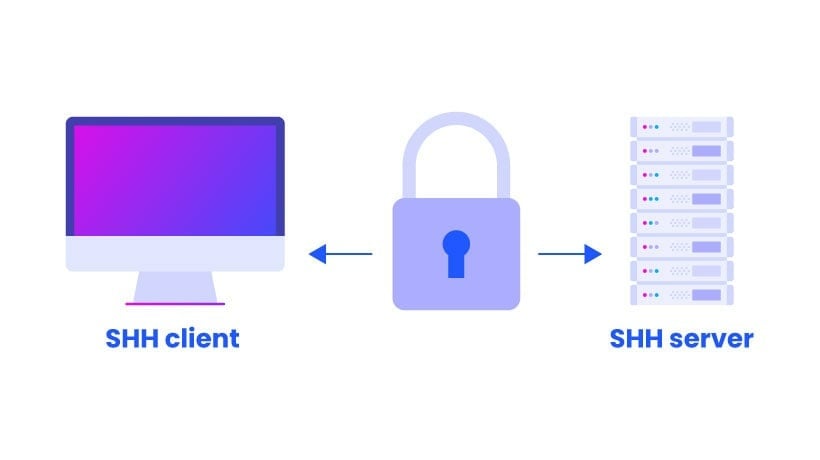SSH Max Limits and Optimization
By: Joshua Njiru
Wed, 15 Jan 2025 17:38:03 +0000

SSH (Secure Shell) is a powerful tool for remote administration and secure data transfer. However, it’s crucial to understand and configure its limits effectively to ensure optimal performance and security. This article will help you understand and configure SSH max limits for optimal performance and security.
Connection Limits
Connection limits in SSH, primarily controlled by settings like
MaxStartups
and
MaxSessions
, are crucial security measures.
MaxStartups
restricts the number of unauthenticated connection attempts, mitigating brute-force attacks.
MaxSessions
limits the number of active sessions per connection, preventing resource exhaustion and potential DoS attacks. These limits, along with other security measures like key-based authentication and firewall rules, contribute to a robust and secure SSH environment.
SSH Max Sessions
Default: 10
Location:
/etc/ssh/sshd_config
Controls maximum number of simultaneous SSH sessions per connection
MaxSessions <span class="token">10</span>
SSH Max Startups
Format:
start:rate:full
Default: 10:30:100
Controls unauthenticated connection attempts
MaxStartups <span class="token">10</span>:30:100
<span class="token"># Allows 10 unauthenticated connections</span>
<span class="token"># 30% probability of dropping connections when limit reached</span>
<span class="token"># Full blocking at 100 connections</span>
Client Alive Interval
Default: 0 (disabled)
Maximum: System dependent
Checks client connectivity every X seconds
ClientAliveInterval <span class="token">300</span>
Client Alive Count Max
Default: 3
Maximum connection check attempts before disconnecting
ClientAliveCountMax <span class="token">3</span>
Authentication Limits
Authentication limits in SSH primarily focus on restricting the number of failed login attempts. This helps prevent brute-force attacks where attackers systematically try various combinations of usernames and passwords to gain unauthorized access. By setting limits on the number of authentication attempts allowed per connection, you can significantly increase the difficulty for attackers to successfully compromise your system.
MaxAuthTries
Default: 6
Maximum authentication attempts before disconnecting
MaxAuthTries <span class="token">6</span>
LoginGraceTime
Default: 120 seconds
Time allowed for successful authentication
LoginGraceTime <span class="token">120</span>
System Resource Limits
System-wide Limits
Edit
/etc/security/limits.conf
:
* soft nofile <span class="token">65535</span>
* hard nofile <span class="token">65535</span>
Process Limits
<span class="token"># Check current limits</span>
<span class="token">ulimit</span> -n
# Set new limit
ulimit -n 65535
Bandwidth Limits
Bandwidth limits in SSH, while not directly configurable within the SSH protocol itself, are an important consideration for overall system performance. Excessive SSH traffic can consume significant network resources, potentially impacting other applications and services.
Individual User Limits
<span class="token"># In sshd_config</span>
Match User username
RateLimit 5M
Global Rate Limiting
Using iptables:
iptables -A INPUT -p tcp --dport <span class="token">22</span> -m state --state NEW -m limit --limit <span class="token">10</span>/minute -j ACCEPT
Performance Optimization
Compression Settings
<span class="token"># In sshd_config</span>
Compression delayed
Cipher Selection
<span class="token"># Faster ciphers first</span>
Ciphers chacha20-poly1305@openssh.com,aes256-gcm@openssh.com,aes128-gcm@openssh.com
Keep Alive Settings
Client-side (
~/.ssh/config
):
Host *
ServerAliveInterval <span class="token">60</span>
ServerAliveCountMax <span class="token">3</span>
File Transfer Limits
SFTP Limits
In
sshd_config
:
Subsystem <span class="token">sftp</span> /usr/lib/openssh/sftp-server -l INFO -f LOCAL6
Match Group sftpusers
ChrootDirectory /sftp/%u
ForceCommand internal-sftp
AllowTcpForwarding no
SCP Limits
<span class="token"># Limit SCP bandwidth</span>
<span class="token">scp</span> -l <span class="token">1000</span> <span class="token"># Limits bandwidth to 1000 Kbit/s</span>
Security Maximums
SSH security maximums encompass various settings designed to thwart malicious attacks.
Key Size Limits
RSA: 16384 bits (practical max)
ECDSA: 521 bits
Ed25519: 256 bits (fixed)
Authentication Timeout
<span class="token"># In sshd_config</span>
AuthenticationMethods publickey,keyboard-interactive
MaxAuthTries <span class="token">3</span>
LoginGraceTime <span class="token">60</span>
Monitoring and Logging
Logging Levels
<span class="token"># In sshd_config</span>
LogLevel VERBOSE
SyslogFacility AUTH
Connection Monitoring
<span class="token"># Active connections</span>
<span class="token">who</span> <span class="token">|</span> <span class="token">grep</span> pts
<span class="token"># SSH processes</span>
<span class="token">ps</span> aux <span class="token">|</span> <span class="token">grep</span> <span class="token">ssh</span>
<span class="token"># Connection attempts</span>
<span class="token">tail</span> -f /var/log/auth.log
Troubleshooting
Check Current Limits
<span class="token"># System limits</span>
sysctl -a <span class="token">|</span> <span class="token">grep</span> max
# SSH daemon limits
sshd -T | grep max
# Process limits
cat /proc/sys/fs/file-max
Common Issues and Solutions
Too Many Open Files
<span class="token"># Check current open files</span>
<span class="token">lsof</span> <span class="token">|</span> <span class="token">grep</span> sshd <span class="token">|</span> <span class="token">wc</span> -l
<span class="token"># Increase system limit</span>
<span class="token">echo</span> <span class="token">"fs.file-max = 100000"</span> <span class="token">>></span> /etc/sysctl.conf
sysctl -p
Connection Drops
<span class="token"># Add to sshd_config</span>
TCPKeepAlive <span class="token">yes</span>
ClientAliveInterval <span class="token">60</span>
ClientAliveCountMax <span class="token">3</span>
Best Practices
Regular Monitoring
<span class="token"># Create monitoring script</span>
<span class="token">#!/bin/bash</span>
<span class="token">echo</span> <span class="token">"Active SSH connections: </span><span class="token">$(</span><span class="token">netstat</span><span class="token"> -tnpa </span><span class="token">|</span> <span class="token">grep</span> <span class="token">'ESTABLISHED.*sshd'</span> <span class="token">|</span> <span class="token">wc</span><span class="token"> -l</span><span class="token">)</span><span class="token">"</span>
<span class="token">echo</span> <span class="token">"Failed attempts: </span><span class="token">$(</span><span class="token">grep</span> <span class="token">"Failed password"</span><span class="token"> /var/log/auth.log </span><span class="token">|</span> <span class="token">wc</span><span class="token"> -l</span><span class="token">)</span><span class="token">"</span>
Automated Cleanup
<span class="token"># Add to crontab</span>
<span class="token">0</span> * * * * <span class="token">pkill</span> -o sshd
Remember to always backup configuration files before making changes and test in a non-production environment first.
Similar Articles from Unixmen
The post SSH Max Limits and Optimization appeared first on Unixmen.
Recommended Comments